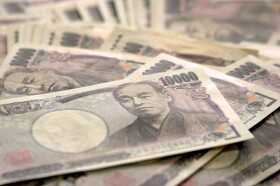The Japanese yen is mixed against multiple major currency rivals midweek as economic data remained bearish. However, many of the numbers either improved from the previous month or beat market expectations. While it looked like a recession was imminent, the slight improvement may delay the recession a bit.
According to the Ministry of Finance, the trade deficit narrowed sharply to $750 million in November, down from $6.75 billion in the same time a year ago. The market had penciled in a trade gap of $3.3 billion.
Imports fell 15.7%, recording their largest decline in about three years following weakened consumption due to the national sales tax hike. The biggest slides were found in mineral fuels, electrical machinery, chemicals, food, manufactured goods, and transport equipment.
Exports dropped 7.9%, posting its 12th consecutive month of declines. Japan reported decreases in manufactured goods, transport equipment, machinery, chemicals, and electrical machinery. The main story in exports, however, was the steep drop in shipments to the US (-12.9%) and China (-5.4%)
In other data, the Jibun Bank manufacturing purchasing managersâ index (PMI) clocked in at 48.8 this month, falling short of the median estimate of 49.5 â anything below 50 indicates a contraction. The services PMI had a better-than-expected reading of 50.6.
The Tertiary Industry Activity Index tumbled 4.6% in October, down from the 2.3% gain in September. It was also worse than the market forecast of -2.5%.
The USD/JPY currency pair rose 0.1% to 109.60, from an opening of 109.48, at 17:11 GMT on Wednesday. The GBP/JPY fell 0.26% to 143.40, from an opening of 143.77.
If you have any questions, comments, or opinions regarding the Japanese Yen, feel free to post them using the commentary form below.
Japanese Yen Mixed As Exports Beat Forecasts
